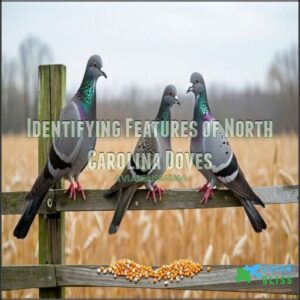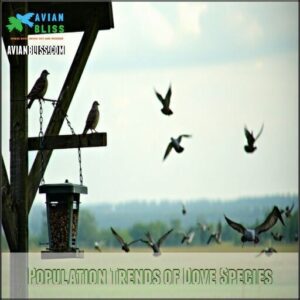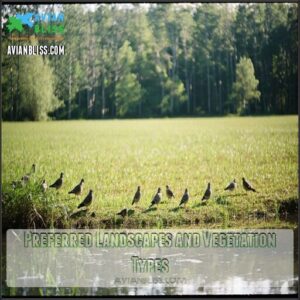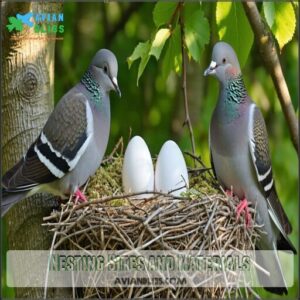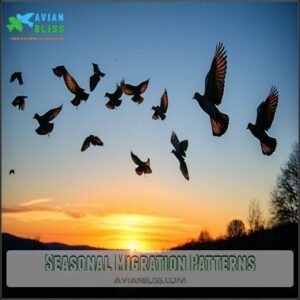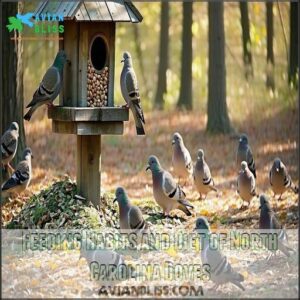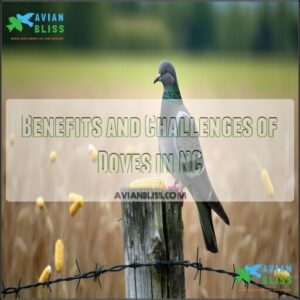This site is supported by our readers. We may earn a commission, at no cost to you, if you purchase through links.
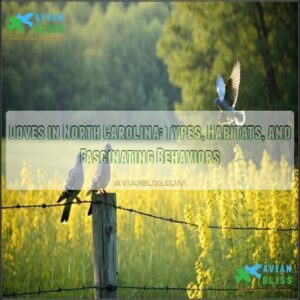
You’ll likely spot Mourning Doves, with their soft coos and swift flight, in open fields or perched on power lines. The Eurasian Collared-Dove, an invasive newcomer, thrives in suburban areas, while Rock Pigeons stick to cities.
These birds feed mainly on seeds, with grit aiding digestion. Mourning Doves are essential to ecosystems, yet urban sprawl challenges their habitats.
Whether you’re a birdwatcher or just curious, doves remind us how wildlife adapts to change. Curious about their nesting habits? Let’s explore further!
Table Of Contents
- Common Dove Species in North Carolina
- Mourning Dove Habitat and Nesting Preferences
- Feeding Habits and Diet of North Carolina Doves
- Dove Hunting Regulations and Seasons in NC
- Benefits and Challenges of Doves in NC
- Frequently Asked Questions (FAQs)
- What type of doves live in North Carolina?
- Is it good to have doves in your yard?
- What’s the difference between a mourning dove and a dove?
- Is it dove season in NC?
- What do doves look like in North Carolina?
- Are mourning doves common in North Carolina?
- Can you hunt doves in North Carolina?
- What are mourning doves?
- Are mourning doves a game bird?
- When is the mourning dove season in North Carolina?
- Conclusion
Common Dove Species in North Carolina
You’ll find three main types of doves across North Carolina: the Mourning Dove, the Rock Pigeon, and the Eurasian Collared-Dove.
Each species has distinct features and habitats, making them easy to recognize if you know what to look for, which is a key aspect of identifying the Mourning Dove.
Mourning Dove Characteristics and Behavior
The Mourning Dove, a familiar sight across North Carolina, stands out with its gentle beauty and fascinating behavior.
A symbol of peace, the Mourning Dove enchants North Carolina with its soft cooing and graceful presence.
Its soft gray-brown plumage, accented by black wing spots, reflects subtle elegance. You’ll recognize their melancholy cooing calls, a trademark of this dove species.
Here’s what else makes them special:
- Plumage variations: Soft gray-brown tones, paler undersides.
- Courtship rituals: Males perform graceful flight patterns.
- Vocalizations: Melancholy calls add charm to their demeanor.
- Social behavior: Often spotted foraging in pairs or flocks.
- Flight patterns: Rapid, powerful bursts with pointed wings.
These doves thrive in diverse habitats and remain iconic symbols of peace.
Rock Pigeon Distribution and Habitat
Rock Pigeons are the urban wildlife champions of North Carolina, thriving in human-altered habitats.
They’ve exchanged natural cliffs for man-made structures, adapting seamlessly to the urban pigeon ecology around busy cities.
You’ll often find them in bustling downtowns, transforming ledges, beams, and bridges into homes.
Their pigeon population density is highest where food scraps and shelter abound.
- Preferred nest spots: building ledges, bridges
- Roosting: flocking on skyscrapers and rooftops
- Adaptations: urbanized, not reliant on natural habitats
- Food sources: human activity scraps
- Behavior: social, thrives in flocks
Eurasian Collared-Dove: an Invasive Species
Among North Carolina doves, the Eurasian Collared-Dove stands out—not just for its sandy-gray feathers and distinct black collar, but for its audacious range expansion.
The Eurasian Collared-Dove captivates with sandy-gray plumage and a bold black collar, symbolizing its remarkable journey of range expansion.
Introduced in the 1970s, it reached North Carolina by 1994, steadily embedding itself in urban and suburban environments.
Unlike native dove species, this invasive species often engages in competitive exclusion, outcompeting native birds for food and nesting spots.
Known for its adaptability, it’s both admired for its resourcefulness and monitored due to its ecological consequences.
Control measures are ongoing as wildlife experts assess this species’ broader invasive impacts on the delicate balance among North Carolina’s ecosystems.
Their diet mainly consists of seeds and grains, which contributes to their adaptability in varied environments.
Identifying Features of North Carolina Doves
When spotting North Carolina birds, focus on key identifiers.
The Mourning Dove is slender, with bluish eye rings, black wing spots, and a pointed tail.
The Rock Pigeons have a bulkier look, patterned plumage variations, and dark wing bars.
The Eurasian Collared-Dove, a newer addition among dove species in NC, is sandy-colored, with a striking black collar.
Want another clue? Leg colors help—Mourning Doves have pink legs!
Listening for their calls can refine your bird identification skills.
Population Trends of Dove Species
Dove population trends in North Carolina provide fascinating insights into species abundance and adaptation. Across the state, mourning doves maintain stable numbers, thriving in suburban areas where bird feeders boost their breeding success.
Rock pigeons continue to dominate city landscapes, adapting effortlessly to urban environments that mimic natural cliffs. Meanwhile, Eurasian collared-doves are expanding steadily since their 1994 arrival, gradually increasing their range.
Habitat loss and climate change are impacting dove migration shifts, as landscapes evolve. White-winged doves, although rare, show fluctuating numbers tied to habitat availability. You’ll notice these adaptable birds flocking to regions with reliable food and water sources.
- Key trends: Stable mourning dove populations, urban rock pigeons, and expanding collared-doves.
- Challenges: Habitat loss and environmental changes.
- Impact: Migration shifts and regional abundance fluctuations.
Mourning Dove Habitat and Nesting Preferences
You’ll find Mourning Doves in open fields, woodland edges, and even urban areas, where they prefer habitats with scattered trees and shrubs.
Their nests are simple yet effective, often made of twigs and grasses, perched in trees or dense vegetation.
Preferred Landscapes and Vegetation Types
In North Carolina, doves flourish across a rich tapestry of habitats, from grasslands and agricultural lands to urban greenery and forest edges.
These adaptable birds seek out landscapes offering easy foraging and shelter, blending perfectly into bird habitats with diverse features.
They’re just as at home pecking seeds in crop fields as they’re scouting from scattered trees.
Looking to attract them? The table below highlights what to include in your own space to welcome doves:
| Habitat Feature | Why It Matters | Dove Benefit |
|---|---|---|
| Open fields | Easy food access | Simple ground foraging |
| Forest edges | Shelter and perch points | Safe roosting/nesting |
| Water nearby | Critical for drinking | Daily hydration sources |
Habitat conservation matters too. Preserving native vegetation alongside urban greenery and farmland creates welcoming havens for dove species.
These birds love spaces with mixed crops, open areas, and vegetation gaps.
Consider using specialized dove feeders to attract them, and remember that habitat conservation is key to their survival, providing them with easy foraging and shelter.
Nesting Sites and Materials
Mourning doves are clever but minimalist nest builders. Their nest construction reflects efficiency—they use small twigs, pine needles, and bits of grass, creating shallow platforms that just cradle their eggs.
Despite appearances, their nesting habits work well for survival.
You’ll find nests in diverse sites, often chosen with care for safety and convenience. Typical nest site selection includes:
- Shrubs or trees: 10-25 feet high, common across North Carolina.
- Abandoned nests: Reused from other birds, a great time-saver.
- Urban nests: Human-made ledges or beams are often sites too.
Ever notice how quickly these nests come together? It’s often the male gathering materials, while the female assembles the structure. Doves often need suitable nesting supplies to build a stable home. Though simple, these nests offer sufficient protection from most nesting predators, boosting their chances of nesting success in urban or rural habitats.
Seasonal Migration Patterns
Migration brings a striking rhythm to North Carolina’s skies. Some mourning doves stay year-round, but many heed the call of seasonal migration. These graceful birds set out on their journeys, influenced by Migration Triggers like shifting temperatures, food supplies, and instinct.
Doves in NC take off in loose flocks, heading to Coastal Stopovers or farther south to their Wintering Grounds. Fall migration begins in August, peaking from September to November. They’ll fly back home during the early spring Return, often in March.
Birds rely on geomagnetic cues for long-distance orientation.
Key Migration Insights:
| Season | Direction | Key Activity |
|---|---|---|
| Fall | Southbound | Moves to warmer areas |
| Winter | Stationary | Feeds, conserves energy |
| Spring | Northbound | Returns for breeding |
Watch for their swooping flocks, nature’s perfect travelers!
Importance of Water Sources
Ensuring water availability is essential for maintaining habitat quality for North Carolina doves, especially the Mourning Dove.
These birds rely on accessible water sources like ponds, streams, and birdbaths, needing clean water within 4 miles of feeding areas.
Regular drinking hydrates them, while bathing helps keep feathers in top condition.
During drought, limited water sources can disrupt dove populations, making conservation strategies vital.
If you’re into birdwatching in North Carolina, add a shallow, clean water source to your yard.
Utilizing a dove water feeder can be a convenient way to provide a consistent water supply.
It supports local doves and enhances your viewing experience—proving that even small efforts can help these graceful birds thrive, and contribute to their overall well-being.
Impact of Urban Development on Dove Habitats
Urban development has shaken up the lives of North Carolina doves, forcing these adaptable birds to navigate fragmented habitats and shifting food sources.
Habitat loss and nesting disruption are now part of their daily challenges, yet doves have shown remarkable adaptation strategies. You often spot them using city parks, rooftops, or even building ledges as substitutes for their natural nesting sites. They’ve traded rural seeds for backyard feeders, parking lot leftovers, and any scattered grains they can find.
Noise pollution, increased predators, and habitat fragmentation haven’t stopped them. These urban birds rise to the challenge with resourceful survival tactics.
- Adaptation strategies: Utilizing man-made structures like power lines and bridges for shelter.
- Food availability: Boldly foraging across neighborhoods and urban landscapes.
- Nesting disruption: Building nests in shrubs, awnings, and even balcony corners.
Feeding Habits and Diet of North Carolina Doves
You’ll find that North Carolina doves primarily feed on seeds, grains, and fruits, making them common visitors to feeders and agricultural fields.
Their diet also relies on grit, small bits of gravel that help them digest food efficiently.
Primary Food Sources for Mourning Doves
After setting up their humble twig nests, Mourning Doves focus on simple yet essential food sources that fuel their daily activity.
These graceful seed eaters rely on an efficient foraging behavior.
- Seed Preferences: Nearly 99% of their diet consists of seeds, with millet and sunflower topping the list.
- Foraging Habits: You’ll often find them pecking on the ground for leftover corn or grain in crop fields.
- Grit Consumption: To aid digestion, they consume tiny stones along with their food.
Seasonal Variations in Dove Diets
North Carolina doves are seed-eating birds with diets that shift as the seasons change.
In spring, dove foraging revolves around fresh sprouts and early seeds, essential during the breeding season. Summer introduces more variety, with wildflower seeds and fruits becoming abundant.
During the fall migration, dove species feast on leftover grains from harvested fields, taking advantage of peak seed availability.
Winter brings a tougher menu, with their winter diet consisting of hardy weed seeds and scattered grains. To support doves during this lean period, consider offering high-energy foods to supplement their diet.
This adaptability showcases why north carolina doves thrive year-round, coping with seasonal challenges while finding what they need to survive, making them a remarkable example of wildlife resilience and ability to find food in diverse environments.
Attracting Doves to Backyard Feeders
If you want to attract North Carolina doves to your yard, focus on their comfort and diet. These backyard birds prefer specific seed types and feeding setups. Scatter favorite bird seed varieties like millet, safflower seeds, and cracked corn on platform feeders or directly on the ground, where they forage naturally.
For success, try these tips:
- Feeder Types: Use ground-level or tray feeders; avoid perch-only models.
- Predator Protection: Place feeders 10-15 feet from bushes to maintain visibility, giving doves an escape route.
- Water Availability: Add shallow birdbaths—doves sip water, not scoop like robins.
- Seed Preferences: Keep seed fresh and dry, replacing spoiled food immediately.
Doves are creatures of habit. Once your yard provides food, safety, and water, expect regular visits from these graceful backyard birds.
Agricultural Impacts on Dove Feeding Patterns
Have you ever noticed how North Carolina doves seem to favor agricultural fields for their meals? These birds smartly adapt to crop availability, often flocking to farming areas that cater perfectly to their feeding habits.
Freshly harvested fields, especially those producing corn, are hotspots where doves forage for scattered kernels left behind by equipment. It’s like a free buffet!
Farming practices heavily influence dove feeding habits. Seed consumption varies as fields shift, and pesticide exposure remains a concern for both food availability and bird health.
Habitat loss also pushes doves closer to agricultural spaces, making these areas vital for their survival.
- Key Insight: Doves thrive in agricultural fields where food availability aligns with their dietary needs, adapting quickly to farming patterns.
By depending so deeply on North Carolina’s farms, doves cleverly sync migration and survival strategies with human activity.
Importance of Grit in Dove Digestion
Doves aren’t just seed-eating birds—they’re grit collectors too! Those tiny pebbles they peck at play a big role in their digestion.
Without teeth, doves use grit in their gizzard to crush seeds, ensuring proper nutrient absorption.
| Grit Type | Benefits | Best For |
|---|---|---|
| Fine Sand | Speeds digestion | Small seeds |
| Tiny Pebbles | Durable grinding | Tough seeds |
| Crushed Shells | Adds calcium | Breeding season |
| River Gravel | Smooth texture | Reduces irritation |
| Commercial Mix | Balanced minerals | Backyard feeders |
Foraging habits thrive with grit source availability. Pair grit with seeds to support dove diets, including crop milk digestion during nesting, which is crucial for their proper nutrient absorption and overall health, making them successful breeders.
Dove Hunting Regulations and Seasons in NC
If you’re planning to hunt doves in North Carolina, understanding the regulations is vital.
With specific seasons, bag limits, and licensing requirements in place, these rules help guarantee sustainable dove populations.
While providing a rewarding experience for hunters.
Hunting Season Dates and Bag Limits
If you’re planning to hunt North Carolina doves, knowing the NC dove season dates and bag limits is key.
The 2024-2025 dove hunting NC schedule includes three segments:
- Fall: September 2 – October 5
- Mid-season: November 9 – 30
- Winter: December 16 – January 31
You can bag up to 15 mourning or white-winged doves daily, with a possession limit of 45.
Shooting hours start 30 minutes before sunrise and end at sunset. Sunday hunting for migratory birds is off-limits.
- Shotguns must hold three shells or fewer.
- No baiting is allowed.
- Conservation impact is monitored closely.
- NC hunting license is required.
- Follow all legal methods to protect dove populations.
Licensing Requirements for Dove Hunting
Before heading out for NC dove season, make sure your paperwork is in order to avoid any hiccups.
Hunting north carolina doves requires compliance with specific regulations.
Here’s what you’ll need:
- Small Game License for legal dove hunting.
- HIP Certification (free, annual) to track migratory bird populations.
- Federal Stamps, mandatory for hunters aged 16 and older.
- Proof of Hunter Education if born after 1975.
- Appropriate permits, like annual or lifetime licenses, covering small game.
Double-check the NC Regulations Digest for up-to-date dove hunting regulations NC.
It’s worth the effort to guarantee smooth participation in NC dove season. Stay prepared, follow the rules, and enjoy the hunt!
Legal Hunting Methods and Equipment
A reliable shotgun, no larger than 10 gauge, is essential for hunting North Carolina doves.
Stick to legal shot sizes and adhere to shotgun shell limits to comply with dove hunting regulations NC.
Camouflage requirements help you blend into the environment, while decoy spreads can improve your chances of attracting birds.
Hunting blinds, whether portable or permanent, offer excellent concealment and comfort.
Don’t forget sturdy boots, ear protection, and a vest to carry essentials.
Mastering dove hunting tips NC, like practicing your aim and timing your shots, is key to success.
Preparation and following regulations guarantee a safe, enjoyable experience during dove hunting seasons NC.
This includes being aware of the importance of legal shot sizes and shotgun shell limits to ensure compliance with regulations.
Baiting Regulations and Restrictions
Understanding baiting regulations is key to a successful dove hunt in North Carolina. Missteps can lead to enforcement penalties, so it’s imperative to follow the rules.
Here’s how to stay compliant:
- Legal Bait Types: Use only natural vegetation or seed from standard agricultural practices.
- Baiting Distance Rules: Confirm no bait is within a prohibited range of your hunting area.
- Natural Vegetation Exemption: Hunting over unaltered vegetation is typically allowed.
- Hunter Responsibilities: Check dove fields NC for hidden bait before hunting.
- Enforcement Penalties: Violations can result in hefty fines or revoked hunting privileges.
To avoid issues, remove bait at least 10 days before hunting. Always confirm with officials if you’re unsure about dove hunting regulations NC. Respect the rules and enjoy the season!
Conservation Efforts and Hunting Impact
Balancing dove hunting in NC with conservation efforts guarantees thriving ecosystems and sustainable hunting.
Habitat preservation and population monitoring are key strategies by the N.C. Wildlife Resources Commission. Adhering to hunting regulations, like bag limits and baiting restrictions, supports Mourning Dove populations and other dove species.
Mourning doves primarily consume seeds.
Here’s a quick look:
| Aspect | Focus | Impact | Goal |
|---|---|---|---|
| Habitat Preservation | Dove-friendly environments | Healthy populations | Long-term sustainability |
| Hunting Regulations | Bag limits, no baiting | Ethical practices | Balanced ecosystems |
| Population Monitoring | Surveys, data collection | Trend analysis | Informed management strategies |
| Management Strategies | Dove fields, food sources | Support breeding | Sustainable hunting practices |
With these efforts, dove hunting NC respects wildlife and secures future enjoyment.
Benefits and Challenges of Doves in NC
You’ll find that doves bring both advantages and challenges to North Carolina’s ecosystems and communities.
While they play a pivotal role in seed dispersal and act as indicators of environmental health, their presence can also lead to agricultural losses.
Their presence can also lead to concerns about disease transmission.
Ecological Role of Doves in Local Ecosystems
Doves in North Carolina are nature’s multitaskers, quietly shaping ecosystems.
These birds aren’t just pretty—they’re essential to the environment.
- Seed Dispersal: Doves scatter seeds, helping plants thrive and supporting diverse habitats.
- Ecosystem Engineers: Their simple nests can shelter other animals, enhancing biodiversity.
- Predator-Prey Dynamics: Doves are a food source for hawks, foxes, and other predators, keeping food webs balanced.
- Nutrient Cycling: Their droppings enrich soil, aiding plant growth.
- Habitat Modification: By foraging, they manage vegetation, reducing invasive species.
North Carolina’s dove species are small but mighty contributors to ecosystem health.
In Georgia, similar to North Carolina, dove hunting regulations are in place to maintain healthy populations.
Doves as Indicators of Environmental Health
Doves in North Carolina are nature’s messengers, offering insights into environmental health.
Their behavior and population trends reveal clues about habitat degradation impact, pesticide exposure effects, and urbanization stress signs.
A sudden drop in dove species may signal climate change influence or ecosystem imbalance.
Protecting these birds helps preserve habitats and biodiversity.
| Indicator | What It Reveals | Example | Action Needed |
|---|---|---|---|
| Migration Patterns | Climate change influence | Late migrations | Monitor timing trends |
| Population Decline | Habitat degradation impact | Fewer nesting sites | Restore vegetation |
| Behavior Changes | Pesticide exposure effects | Erratic feeding habits | Reduce pesticide use |
| Urban Nesting Increase | Urbanization stress signs | More city sightings | Create green spaces |
Potential Agricultural Impacts of Dove Populations
North Carolina doves bring more to farms than meets the eye.
While crop damage from these seed-eating birds is minimal, their seed consumption helps control weeds naturally.
They also contribute to fertilizer distribution through droppings, enriching the soil.
By allowing doves to thrive, you’re fostering habitat modification that supports pest control and biodiversity.
- Crop Damage: Rare and manageable.
- Weed Control: Seeds consumed reduce invasive plants.
- Soil Health: Droppings act as natural fertilizer.
Doves in Urban and Suburban Settings
In the bustling neighborhoods of North Carolina, doves showcase remarkable urban adaptation. They’ve learned to thrive in Urban Dove Habitats, often nesting on balconies, rooftops, or tucked-away tree branches.
Despite challenges like noise pollution and limited resources, these North American birds persist with quiet resilience.
Suburban Dove Diets often revolve around backyard feeders, where they enthusiastically forage for seeds like millet and sunflower.
You can encourage Dove-Human Interaction by creating a welcoming space:
- Plant native shrubs for shelter and nesting opportunities.
- Provide seeds in feeders positioned away from predators and heavy activity.
- Maintain open ground areas for their preferred feeding style.
Urban Nesting Sites highlight the adaptability of doves, proving their ability to coexist in human-dominated landscapes.
Disease Transmission and Management in Doves
Dirty feeders and water sources can spread Avian Pox, Salmonella, and Psittacosis among North Carolina doves.
Trichomoniasis control starts with cleaning feeders and birdbaths weekly using a 10% bleach solution. Removing feeders temporarily during outbreaks helps protect bird populations.
Newcastle Disease, though rare, underscores the need for vigilance.
Thoughtful wildlife management keeps doves healthy, ensuring your backyard remains a safe haven for birdwatching and supporting broader conservation efforts across North Carolina.
Frequently Asked Questions (FAQs)
What type of doves live in North Carolina?
You mightn’t expect it, but North Carolina hosts Mourning Doves, Eurasian Collared-Doves, Rock Pigeons, and rare White-winged Doves.
Each species thrives in diverse habitats, from urban streets to open fields and woodland edges.
Is it good to have doves in your yard?
Having doves in your yard is great! They’re peaceful, eat seeds, and add charm.
Just provide water, safe feeders, and shrubs for nesting.
Their cooing creates a serene vibe, but watch out for predators.
What’s the difference between a mourning dove and a dove?
Picture a soft coo floating through the air—mourning doves are a specific type of dove, known for their slender bodies, grayish-brown feathers, and long tails.
"Dove" is a broader term for similar bird species.
Is it dove season in NC?
No, it’s not dove season in North Carolina right now.
The last segment ended January 31,
Dove hunting typically resumes in early September, so you’ll need to wait a few months.
Hunters should consult the migratory game bird seasons for specific dates.
What do doves look like in North Carolina?
Ever noticed a bird with soft gray-brown feathers, a slender build, and a long tail?
That’s likely a Mourning Dove.
In North Carolina, they’re common, alongside Rock Pigeons and sandy-colored Eurasian Collared-Doves.
Are mourning doves common in North Carolina?
Yes, mourning doves are incredibly common in North Carolina.
You’ll spot them year-round in backyards, open fields, and woodland edges.
Their soft cooing and graceful flight make them a familiar and beloved sight statewide.
Can you hunt doves in North Carolina?
You can hunt doves in North Carolina during the season from September to January.
You’ll need a hunting license, HIP certification, and follow regulations like bag limits, possession limits, and restrictions on baiting.
What are mourning doves?
Graceful yet resilient, mourning doves balance beauty and survival.
With soft gray-brown feathers, pink legs, and a distinctive cooing call, they’re common across North America.
They thrive in fields, suburbs, and even your backyard bird feeder, making them a common sight.
Are mourning doves a game bird?
Mourning doves are indeed a game bird in North Carolina.
They’re hunted during regulated seasons, with strict bag limits and licensing rules in place to guarantee sustainable populations while supporting traditional hunting practices.
When is the mourning dove season in North Carolina?
Mourning dove season in North Carolina typically runs from early September to mid-January.
You’ll need a valid hunting license, HIP certification, and follow the daily bag limit of 15 doves per person.
Conclusion
Who knew doves in North Carolina could be so complex?
From the adaptable Mourning Dove to the city-loving Rock Pigeon, these birds thrive despite challenges like urban sprawl.
Their diets, nesting habits, and ecological roles highlight how wildlife adjusts to human impact.
Whether you’re watching them coo from a power line or considering hunting regulations, doves connect us to nature’s resilience.
They’re more than just birds; they’re survivalists in feathers.




